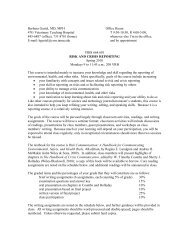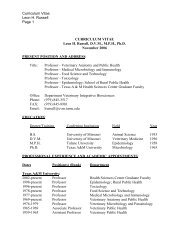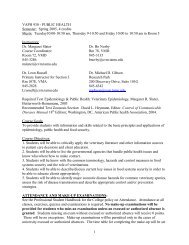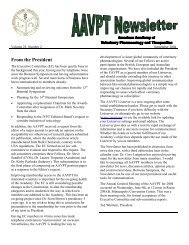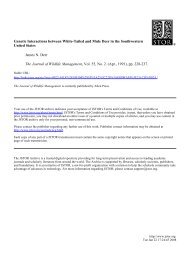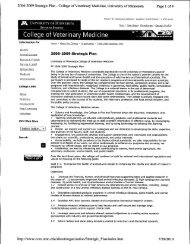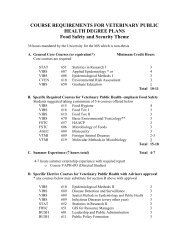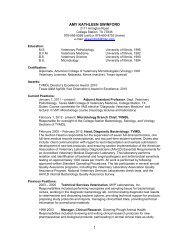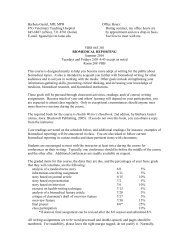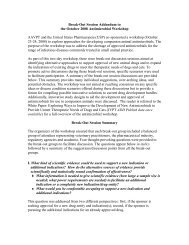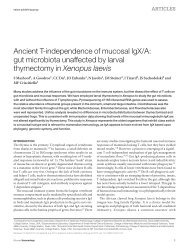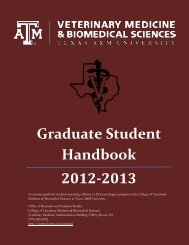Download PDF - College of Veterinary Medicine - Texas A&M ...
Download PDF - College of Veterinary Medicine - Texas A&M ...
Download PDF - College of Veterinary Medicine - Texas A&M ...
Create successful ePaper yourself
Turn your PDF publications into a flip-book with our unique Google optimized e-Paper software.
Faculty/Staff Focus<br />
<strong>Texas</strong> A&M, MD Anderson team up<br />
to treat canine non-Hodgkin Lymphoma<br />
A new immunotherapy for<br />
companion dogs with advanced-stage<br />
non-Hodgkin Lymphoma (NHL) has<br />
been shown to improve survival while<br />
maintaining quality <strong>of</strong> life, according<br />
to a study reported in the journal<br />
Scientific Reports. The study resulted<br />
from a collaboration between the<br />
University <strong>of</strong> <strong>Texas</strong> MD Anderson<br />
Children’s Cancer Hospital in Houston<br />
and the <strong>Texas</strong> A&M University <strong>College</strong><br />
<strong>of</strong> <strong>Veterinary</strong> <strong>Medicine</strong> & Biomedical<br />
Sciences (CVM).<br />
Using a T-cell therapy developed<br />
at MD Anderson Children’s Cancer<br />
Hospital, veterinarians from <strong>Texas</strong><br />
A&M saw a nearly four-fold increase<br />
in tumor-free survival compared to<br />
survival in dogs who received only<br />
chemotherapy. The median tumorfree<br />
survival for the <strong>Texas</strong>-based dogs<br />
increased by nearly nine months, which<br />
is roughly equivalent to seven years in a<br />
human life.<br />
NHL is one <strong>of</strong> the most common<br />
cancers in dogs, according to <strong>Texas</strong><br />
A&M veterinarians. Although standard<br />
chemotherapy can achieve remission,<br />
it is rarely curative, with the two-year<br />
survival rate remaining less than 20<br />
percent. Therefore, when investigators<br />
from MD Anderson and <strong>Texas</strong> A&M<br />
met, they explored the feasibility<br />
Dr. Heather Wilson-Robles<br />
58 • CVM Today • Winter 2012<br />
<strong>of</strong> administering T-cells to improve<br />
survival.<br />
“We followed the same rigid<br />
standards that we practice for human<br />
clinical trials at MD Anderson to<br />
ensure the safety <strong>of</strong> each dog,” said<br />
Laurence Cooper, M.D., Ph.D.,<br />
pr<strong>of</strong>essor and section chief <strong>of</strong> cell<br />
therapy at the children’s hospital<br />
and senior investigator on the study.<br />
“While these pets are benefiting from<br />
the T-cell infusions, this collaboration<br />
with <strong>Texas</strong> A&M is a driving force for<br />
undertaking similar clinical trials in<br />
humans.”<br />
To accomplish the T-cell therapy,<br />
researchers took a sample <strong>of</strong> blood<br />
from each dog entering the study.<br />
Then, the T-cells were separated and<br />
expanded in Cooper’s laboratory<br />
over several weeks. As the T-cells<br />
grew at MD Anderson, the dogs<br />
received a chemotherapy regimen<br />
at the CVM similar to what humans<br />
with NHL receive: a combination<br />
<strong>of</strong> cyclophosphamide, vincristine,<br />
doxorubicin, and prednisone.<br />
The T-cells were then given back<br />
intravenously after the chemotherapy<br />
to improve the anti-tumor effects.<br />
“The therapy was well tolerated in<br />
all dogs who received the infusions.<br />
We saw fewer side effects than with<br />
traditional chemotherapy, and the pet<br />
owners were pleased with how their<br />
dogs tolerated the protocol,” said<br />
Dr. Heather Wilson-Robles, assistant<br />
pr<strong>of</strong>essor at the CVM. “The owners<br />
were also very pleased to be supporting<br />
research that may further enhance<br />
cancer therapy in humans and pets<br />
with cancer.”<br />
“Treating dogs with cancer provides<br />
us with a great comparative oncology<br />
model for humans,” said Colleen<br />
O’Connor, Ph.D., postdoctoral fellow at<br />
MD Anderson and one <strong>of</strong> the primary<br />
investigators on the study. “We learned<br />
important details about the interaction<br />
between chemotherapy and tumor<br />
cells that can be harnessed to improve<br />
the body’s immune response. This<br />
is something we hadn’t appreciated<br />
thus far from our clinical research in<br />
humans.”<br />
From the trial, investigators found<br />
that:<br />
• Chemotherapy, in addition to<br />
damaging the canine tumor, also<br />
makes the tumor cells susceptible to<br />
“Treating dogs with cancer provides us with a great<br />
comparative oncology model for humans.”<br />
~ Dr. Colleen O’Connor<br />
recognition by the infused T-cells.<br />
• Infusing back the patient’s T-cells<br />
after chemotherapy can work to<br />
improve the survival <strong>of</strong> dogs with NHL,<br />
since these T-cells were held outside<br />
the body preventing damage from the<br />
chemotherapy.<br />
• Biomarkers were identified that can<br />
potentially play a role in determining<br />
prognosis.<br />
Overall, the study affirmed the<br />
ability to use the body’s own immune<br />
cells, such as T-cells, to fight cancer. As<br />
a result, MD Anderson and the CVM<br />
collaborators are creating a program<br />
focusing on harvesting and expanding<br />
T-cells on a large scale for broad<br />
clinical use.<br />
Investigators at both institutions<br />
are working to begin a new trial that<br />
will infuse genetically modified T-cells<br />
that are tumor specific and potentially<br />
even more effective against the canine<br />
cancer cells.<br />
Other contributors to the Scientific<br />
Reports study include Sabina Sheppard,<br />
research associate, and Dr. Mark<br />
Johnson, clinical associate pr<strong>of</strong>essor,<br />
from <strong>Texas</strong> A&M, Cassie Hartline,<br />
Helen Huls, Shana Palla, Sourindra<br />
Maiti, Wencai Ma, Eric Davis, Suzanne<br />
Craig, Dean Lee, and Richard<br />
Champlin from MD Anderson.



